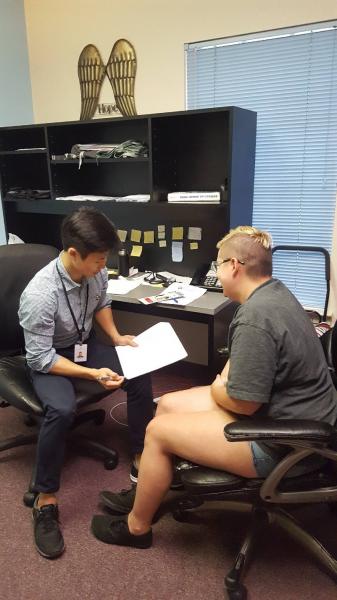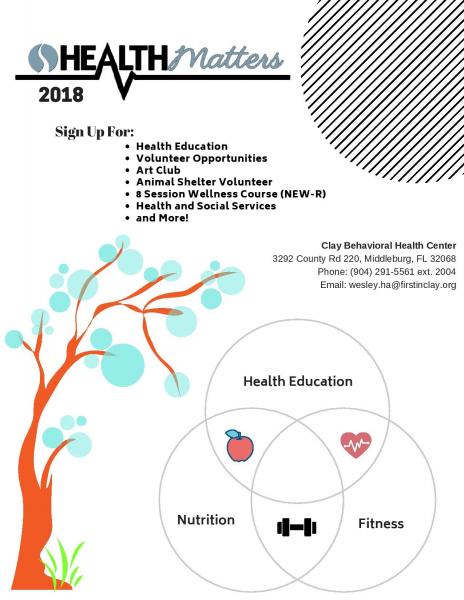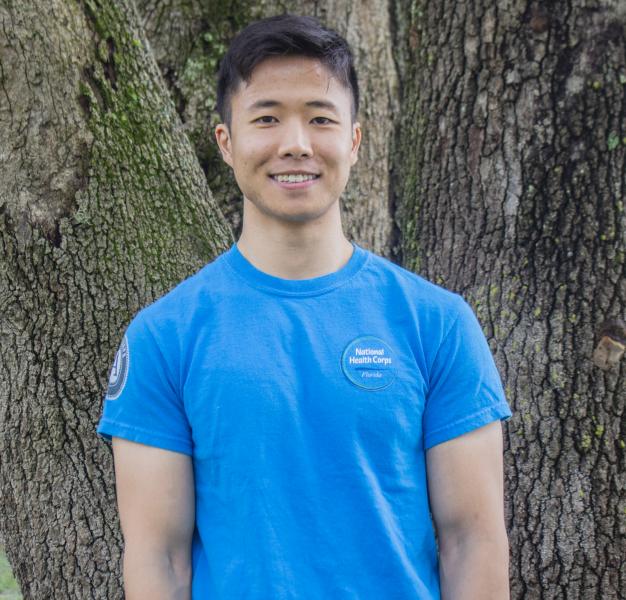Boy Y
 |
| NHC FL AmeriCorps Member, Wesley Ha interviews client |
"Can you say 'Ahhh' for me? Very good, we're taking your temperature to make sure you're healthy!" For many of our pediatric patients, I had grown accustomed to holding the thermometer for them, and explaining as simply as possible what their vital signs meant. With our older, adult clients, I spend time tailoring referrals and services based on their individual care needs. Mr A, a long time enrolled member of our Health Matters Program, has enjoyed free primary care through our services. Mrs B, another one of our clients, has been struggling with her diabetes and has decided to enroll in one of our wellness classes to learn more about nutrition. The idea was that supplementing health education with medical care would increase self-awareness of biomedical and psychiatric needs and our clients would respond to this increased awareness by changing life habits and prevent the onset of chronic illness by improving their overall health. This would in turn result in patient empowerment by aiding patients in taking back control of their own lives. Most importantly, we were doing something many of our clients felt they never had or had lost, which was letting them know they have someone in their corner that believes in them.
As an AmeriCorps member, health education and advocacy has been the most common way of empowering patients, but not all cases are so simple. Boy Y was a patient at Clay Behavioral Health. He had arrived with his care giver, who walked in distraught and in distress. From a glance, Boy Y looked about 10 years old, and through habit, I had reached out for the thermometer and said "Hi Boy Y, can you say 'Ahhh' for me? We're just taking some quick vitals before seeing the doctor." He stared blankly at me. He was 16 years old, born with hydrocephalus with ventriculoperitoneal shunt in place, and severely developmentally delayed. Boy Y then began to strike his own head. His care giver stepped in, grabbed him from behind, and began to rock back and forth. His caregiver then told me that she wished to have him institutionalized. Could this be the only option? I felt powerless as nothing I did provoked normative responses, and my sincere desires to help Boy Y remained unfulfilled. His provider, who had seen him for nearly a decade, explained that medication and eventual placement into a care facility were the only viable options.
 |
| Health Matters Wellness Class Flier |
I thought of the various patients I had met in my time serving in palliative care centers and hospices. I thought of the patient in the operating room, chest open, and heart connected to the heart-lung machine, with their lives literally in the hands of their surgeons. There are many instances where patients and clients may not have volitional power; where in cases such as Boy Y, the etiology of illness may be neurological, and the patient may have physiologic barriers to addressing their own needs. In such cases, we defer power to those we believe have the patient’s best interest in mind; to those that have stood alongside the patient through their struggles and challenges and understand them better than anyone else.
Empowering patients, or any vulnerable, disenfranchised, underrepresented persons, can be challenging. Through AmeriCorps and the various host sites our organization has partnered with, we have been blessed with many, many different services we can provide for our clients. In my own host site at Clay Behavioral Health, health education and social service navigation have been at the forefront among different methods of improving the quality of life of our patients through empowerment. In the case of Boy Y, and so many others who suffer from disabilities, traditional means of bringing back ownership of health to clients isn’t sufficient; however, what this experience has taught me is that there are still ways we can strive to improve the quality of life for these patients by compassionately caring for them as Boy Y’s provider had done for the past decade.

This blog post was written by NHC FL AmeriCorps member, Wesley Ha.
Wesley serves at Clay Behavioral Health Center as a Care Coordinator.